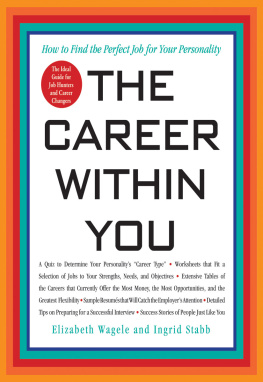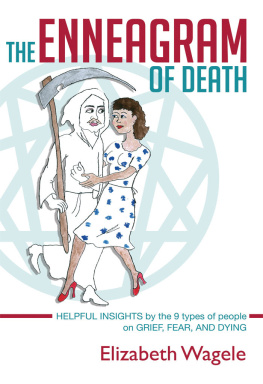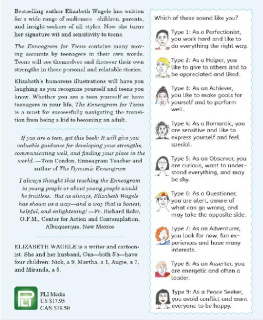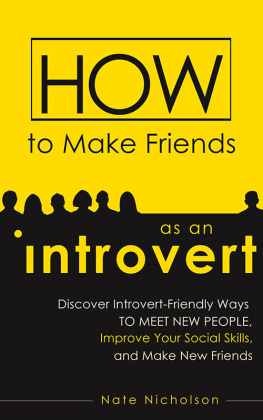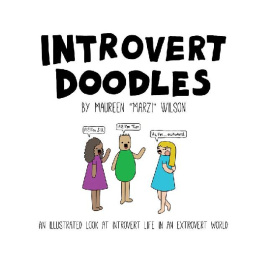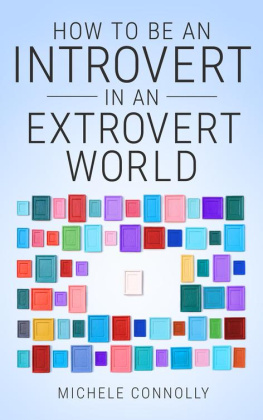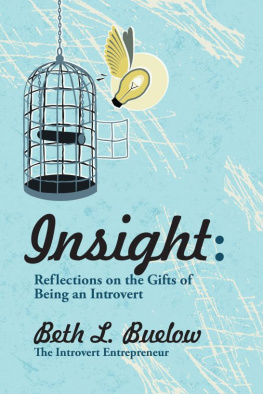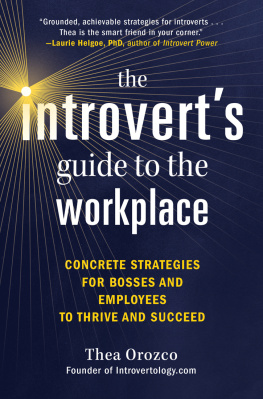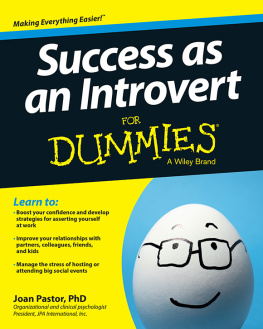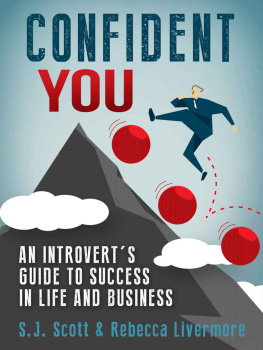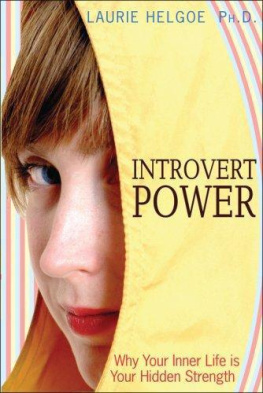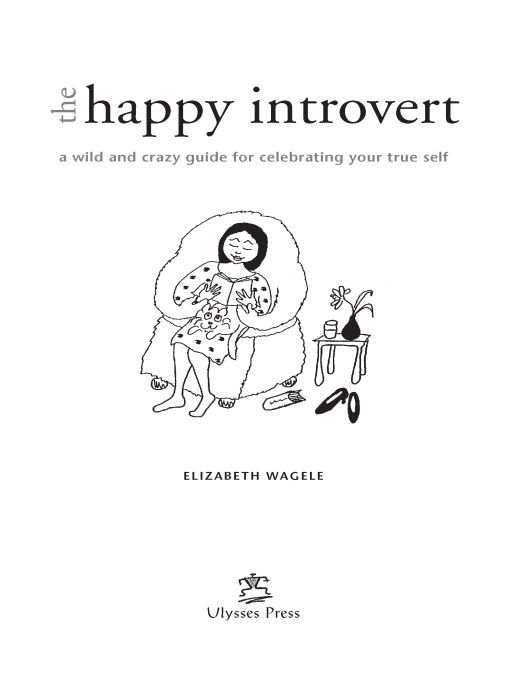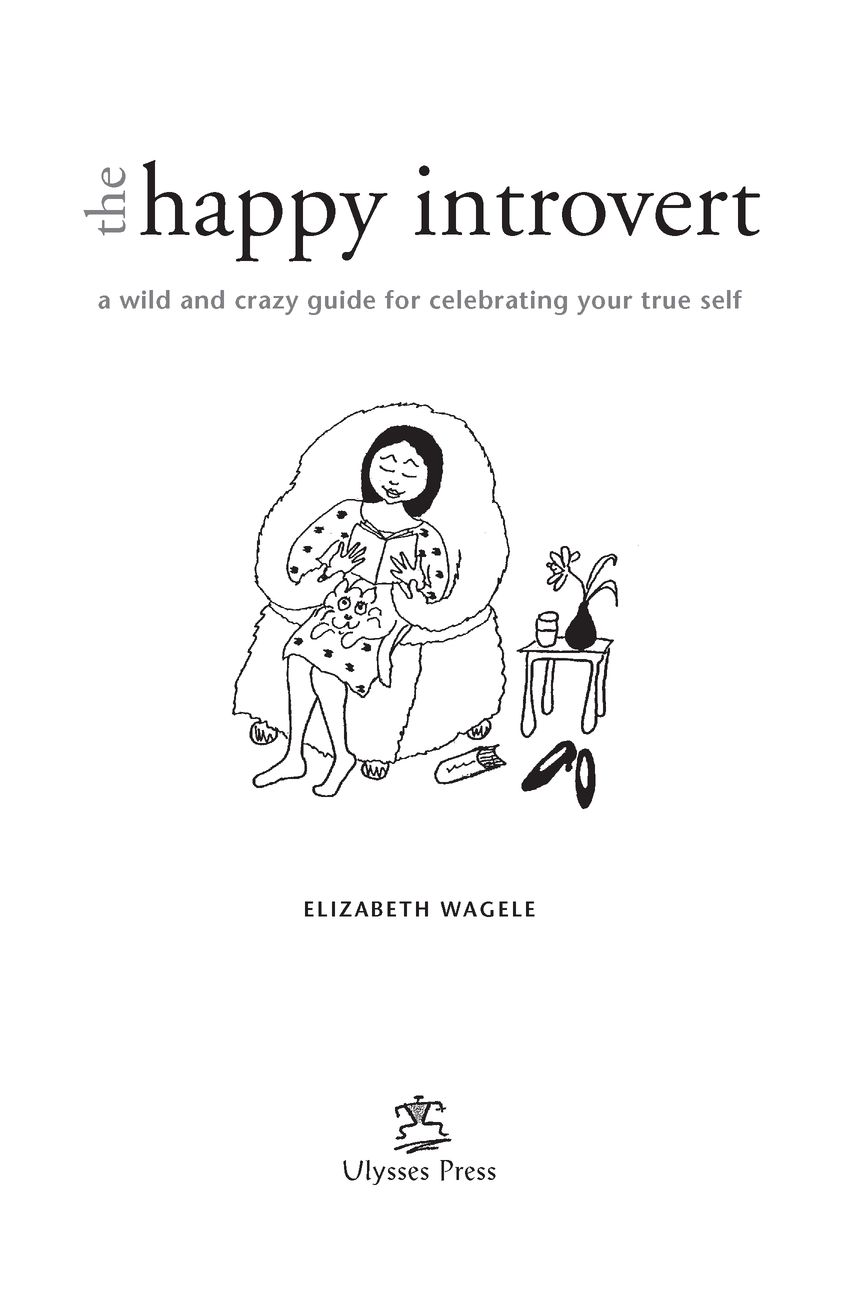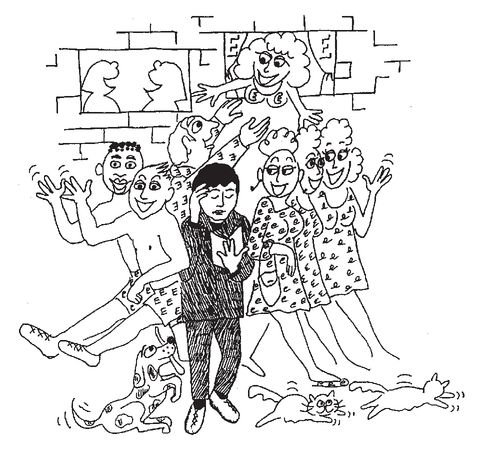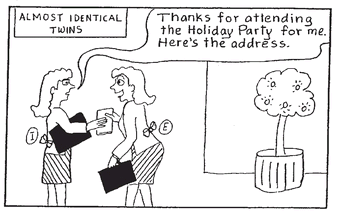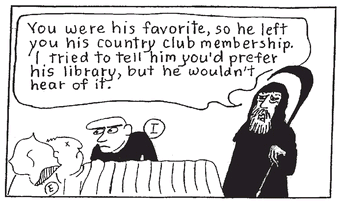Table of Contents
To my family and friends. To understanding and acceptance.
The Introvert in an Extraverted World
Eastern cultures see introversion as a value and give it much esteem. Western cultures prefer extraversion. For a balanced, safe, and caring world, we must learn to value both.
John Weber
The other day, I heard a news anchor on a major TV network disdainfully refer to a bad guy whos been in the news a lot recently as a recluse and an introverted nut case. The juxtaposition of the words introverted and nut case really pushed my buttons since Im an introvert myself. The first time I felt sensitive about this was as a teenager having a discussion with my mother. When I casually and proudly referred to myself as an introvert, she shot back angrily, You are not! Youre a nice girl!
It wasnt long before I realized there were others besides my mother for whom introvert had a negative meaning. A headline in a popular magazine, for example, erroneously claimed that the most important ingredient for happiness is to not be an introvert. I strongly disagree.
The rich inner lives we introverts lead enable us to
feel comfortable with ourselves and to be interesting to our friends. Some of the most brilliant, creative, and productive humans in history (Einstein, Jane Austen, Beethoven, Michelangelo, Isaac Newton, and Howard Hughes, for example) were introverts.
Each of us uses both introversion and extraversion in our daily lives, but our personalities are characterized by one of these attitudes more than the other. This is probably the most important personality difference there is. Both types have social needs, but some introverts, like whales, can be alone for weeks before needing to come together with other beings. Extraverts usually need to connect more frequently and have a larger amount of friends and acquaintances.
While its true that some of us introverts can be hard to get to know, being quiet, or even reclusive, at times doesnt make us aliens or weirdos. Besides, is this any worse than those overly gregarious people who are on stage all the time?
Introverts and extraverts often excel in different areas, so we could help each other out...
... but instead, many unnecessary misunderstandings, some irreversible, occur between us every day.
I called this book The Happy Introvert to dispel the belief that to be an introvert means you are a victim of depression or another unhappy state. I wanted to set the record straight before anyone cracked open the book. Yes, we introverts can be happy. We experience the usual range of human feelings, including joy and contentment. Our values are somewhat different from extraverts, however. We excel in the kind of happiness which compels us to develop skills and knowledge that will sustain a rich inner life.
If youre an introvert, you may feel relieved that someone knows an introvert is capable of this kind of contentment.
I love being thought of as a happy introvert. Being alone is always relaxing for me. I am quite social for an introvert, but it always feels good when events are over and I can digest them alone.Jim Campbell
Balanced introspection and extrospection, going in and going out, in calm harmonious poise, leads to awareness of the microcosm within, and in that awarenesslo! life is an open book, and they who are awake may read livingly.
Sunyata
Why Its Important to Learn about Personality Differences
Parents and teachers can use their knowledge about personality differences to work with childrens learning styles and allow their true personalities to unfold. Employers can run more efficient businesses by giving introverts the privacy we need and assigning extraverts jobs that allow them to use their people skills. Adolescents self-regard and self-esteem improve when they learn that introversion and extraversion are equally legitimate human attributes.
On an individual level, studying your introverted and extraverted attitudes will help you value your strengths and become more realistic about your limitations. The prevailing view is that being moral means to be in harmony with the group: You are suspect if you dont go along. This makes such an emotional impact on introverts that many of us fool ourselves into thinking we, too, are extraverts. But not accepting ones true nature creates stress. I used to force myself to attend events I didnt enjoy. When I finally realized I didnt need to suffer through certain kinds of social functions, I stopped going to them and devoted more time to activities I liked.
About This Book
First, this book celebrates the richness we introverts experience in our inner worlds, and acknowledges that these experiences can be exported for others to enjoy if we choose. Practical suggestions help us introverts become even happier by learning to negotiate the extraverted world and stand up for ourselves and each other.
Second, regardless of where the parts of your personality fall on the introversion/extraversion continuum, youll find information here for getting along more smoothly with the introverts in your life.
Chapter 5 is important for adding to your life through the introverted process and creativity.
Notice if some of my cartoons bring a smile to your facetheyre speaking in an introverted way, from a happy place in me to a happy place in you.
Introverts and Extraverts
When we look at introversion/extraversion as two aspects of the same person, the inner (intro) part mostly refers to perceiving, thinking, imagining, conceiving, and reflecting. The outer (extra) part is mostly concerned with the parts of our lives where we socialize, network, reach out, and get things done.
ARE YOU AN INTROVERT?
Note how many of these statements you agree with:
1. You usually like being with people (not too many at once) for no longer than an hour or two at a time.
2. In group discussions, the topic being discussed sometimes changes by the time you have collected your thoughts and are ready to speak.
3. People sometimes realize you are interesting only after they get to know you.
4. You dislike being asked broad, sweeping questionsespecially by strangers.
5. You are critical of superficiality.
6. You sometimes procrastinate when you want to avoid interacting with people.


